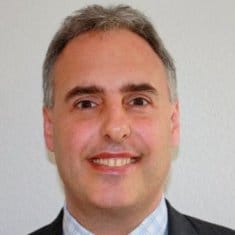It is no coincidence that the past two winners of the Wharton Club of New York’s Joseph Wharton Awards for Public Service have been celebrities in the health care space: TV’s Dr. Mehmet Oz, M’86, WG’86, and Thomas Jefferson University’s Dr. David B. Nash, WG’86. It is in health care that great good can be done, in the U.S. and around the world. Dr. Gary Phillips, WG’91, is on just such a task for the World Economic Forum.
As head of health care industries for the Switzerland-based institution, Phillips is currently overseeing research into ways to improve and increase access to health care with private-public collaboration through the lens of the financial sustainability of health systems.
Phillips brings to his WEF position a broad industry background. Previously, he served in health care roles in the Navy, in consulting, and with big pharma and device-making corporations.

Dr. Gary Phillips, WG’91
Part of the project involves making the case for change, as well as determining what that change could look like by 2040. The research has spurred dialogue between industry leaders and national health ministers from such countries as Germany, Spain, Turkey and the U.K.
One resulting observation is that there will be three common facets of the “future” health system: that it will organize around the individual, aim to deliver value, and shift and transform roles of key stakeholders. Phillips and team will ultimately present their research findings at the upcoming Davos meeting.
Perhaps one of the more surprising findings in Phillips’ research with the WEF is that, for some countries, this talk is not just about politics or wishful thinking.
“Germany will be the health leader,” Phillips said during a presentation at the Annual Wharton Alumni Healthcare Conference on campus on Saturday, Oct. 27. “They want to be a model for the world in efficiency and quality.”
Their health care delivery system will be a source of national pride in Germany if plans work out. And economic sense, not just patriotism, is driving it, as Germany is seeking to become a magnet for medical tourism and is as well known for exporting health quality as it is for luxury automobiles, Phillips said.
Germany seeks to solve the Holy Grail of 21st century health care: What is the business model around preventative medicine?
“This is a very emotional and a very cultural dialogue,” Phillips told the audience, which consisted of nearly 150 alumni in the health care field.
Conference attendees later enjoyed a day-long agenda including sessions on health care delivery systems, innovation in medical delivery and payment, personalized medicine and insurance. The event was organized by the Wharton HealthCare Alumni Association, and made possible with the energy and efforts of individual alumnus such as WHCMMA Vice President Jeff Voigt, WG’85.

























